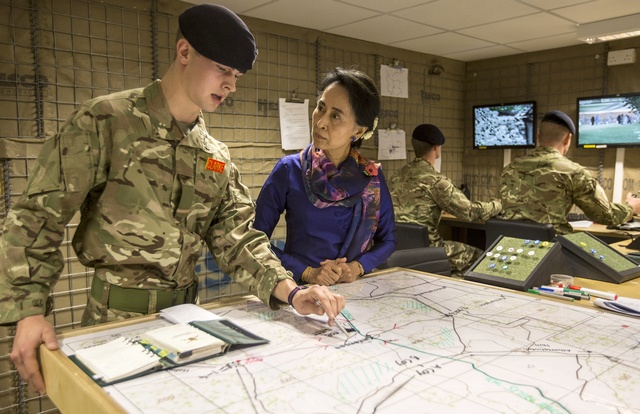Democracy icon Aung San Suu Kyi on Friday praised the British military, insisting that she wanted to learn “how a good, professional army operates” in order to take lessons back to Burma.
On a visit to the UK military academy Sandhurst, the Nobel laureate said Burma needed to have a “good, professional army that is respected and honoured by the people”.
“The country should not be the servant of the army,” she told an audience of academy members. “The army must be the foundation of the country. That is exactly what you’re trying to teach people at Sandhurst. You serve to lead.”
She met with cadets over a cup of tea and praised Sandhurst for teaching “the right kind of leadership that will make an army body that is meant to defend rather than to destroy”.
Suu Kyi, whose father Aung San is the founder of the modern Burmese army and hero of the campaign for independence from Britain, is currently on a diplomatic tour of Europe where she has met with political leaders, including Prime Minister David Cameron.
Britain has already offered to deliver training to the Burmese military, which they say will focus on human rights and democratic accountability, but has sparked concerns among campaigners who worry that it could fuel abuses in ethnic minority regions.
The opposition leader spent much of two decades under house arrest at the hands of the former military regime, before finally being released in November 2010. She has since taken a seat in parliament and has expressed hopes of running for president in the next general elections in 2015.
But she has insisted that the current constitution, which bars her from the presidency and is considered deeply undemocratic, must first be reformed.
“It’s not just to do with me as a possible president, the constitution as it stands is meant to create a very, very limited form of democracy,” she said. “The whole world thinks that Burma is on the path to democratisation, with this constitution we’d only get so far and no further.”
Suu Kyi, who has transitioned from icon to politician in little over a year, has also come under increased media scrutiny. Last week, she faced a barrage of criticisms for an interview with the BBC in which she appeared to trivialise a wave of anti-Muslim violence to grip the country.
[related]
According to government figures, almost 250 people have been killed and 140,000 people displaced in several bouts of clashes, which kicked off in western Arakan state last year and has since spread to other parts of Burma.
A UN envoy warned last week that the violence, which has disproportionately targeted Burma’s Muslim minority, threatens to derail the country’s reform process.
“I condemn all violence and hatred but I don’t believe in condemning people. It’s the axe we don’t like,” Suu Kyi told Reuters in an interview. “The people we can reform, people can be made to see things in a different light. If we want to get them together, condemnation is not the way.”
“The way is to make them feel secure enough to be able to look at each other’s problems objectively and to recognise that everybody has his own fears and hatreds, and we’ve got to try to get rid of those.”



